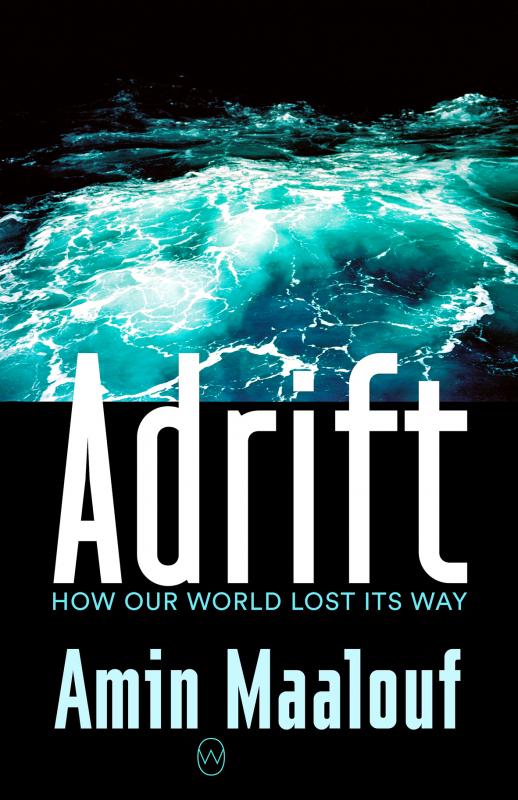By unhappy coincidence, Amin Maalouf’s thought-provoking analysis of what is wrong with our lives was published in English shortly after the massively destructive explosion last month in his birthplace, Beirut. That horrific event served as a bleak reminder of the dysfunctionality not only of Lebanon but of the Middle East as a whole — and, indeed, the wider world — in the early decades of the 21st century.
Maalouf is an acclaimed journalist, novelist and historian who has lived for decades in Paris and writes in French rather than Arabic. He is a member of the Academie Française and a winner of the Prix Goncourt. But his early years, with lasting links to Lebanon and Egypt (where his mother came from and where he spent time as a child), have proved deeply influential.
Adrift begins with a potted but intensely personal history of what the author calls the Levant — a term that originated in a Europe that viewed the region as the “cradle of civilization” in its own backyard and which began to influence it from the Crusades, through 400 years of Ottoman imperial rule to the first world war and beyond.

“It is from my native land that the shadows spread and engulfed the world,” he writes.
Gamal Abdel Nasser’s charismatic rule in Cairo, the Suez crisis in 1956, Israel’s victory in the war of 1967 (when “Arab despair was born”) and the Iranian revolution of 1979 are all turning points for Middle Eastern geopolitics. Maalouf’s USP is interpreting the events of his lifetime to ponder the links between identity, religion, culture and power — and providing trenchant conclusions in impressively clear prose.
Shortly before Maalouf’s birth in 1949, the founder of the Muslim Brotherhood, Hassan al-Banna, was assassinated in Cairo, heralding a struggle between Islamists and autocrats that continues to this day. Maalouf feels nostalgic for a world that has been lost: the celebrated diva Umm Kulthum, the Alexandria-born Greek poet Constantine Cavafy and the renowned Cairo patisserie Groppi are all reminders of a liberal, cosmopolitan paradise called Egypt.
Maalouf left Lebanon at the start of the civil war in 1975.
“It is almost as though we have all suffered a powerful mental earthquake, whose epicenter lies somewhere near the place I was born,” he reflects. “And it is precisely because I was born and grew up on this ‘fault line’ that I am trying to understand how the quake occurred, and why the aftershocks have spread around the world, with the calamitous consequences now familiar to us all.”
Beyond the Middle East, Maalouf defines 1979 as “a bookmark in the great ledger of time.” That was the year Margaret Thatcher was elected in Britain and influenced Ronald Reagan in the US. On both sides of the Atlantic the combined effect was to reduce government intervention, promote free-market economics and increase social inequality. The previous year, Deng Xiaoping (鄧小平) had taken over the Chinese Communist party and Pope John Paul II became head of the Catholic church.
The Soviet invasion of Afghanistan was another landmark, exploited by the US to provide Moscow’s equivalent of its own Vietnam war, which fed into the collapse of the USSR — and the rise of jihadi extremism personified by a young Saudi called Osama bin Laden.
Personal experience combines with Maalouf’s privileged professional life: as a young man, he worked for the Lebanese daily An-Nahar and later became editor of Jeune Afrique magazine. He interviewed Indira Gandhi, witnessed the 1974 Marxist coup in Ethiopia, covered the fall of Saigon in 1975 and was on assignment in Tehran when Ayatollah Khomeini arrived home to replace the Shah.
Reflecting on recent decades, Maalouf addresses global warming and technological changes including the digital revolution and robotics that are likely to cause hundreds of millions of jobs to disappear — mind-boggling social and economic challenges. He links the rise of fragmented identity politics to Brexit — embodying populism and the failure of the European project (referencing separatism in Scotland and Catalonia). He is disturbed by the loss of America’s moral credibility, which has accelerated during the disruptive term of US President Donald Trump. Global government, embodied by UN institutions, has also suffered.
Inevitably for this English-language edition, an afterword is dedicated to responses to the COVID-19 pandemic, which he defines, with characteristic elegance, as a “stress test for every country on earth” and, more specifically, “a cataclysm that has gravely compromised the moral legitimacy of economic liberalism” — because of the impact of budget cuts on increasingly privatized national health systems.
Maalouf returns repeatedly to the depressingly familiar fault lines of “his” Levant, but thankfully draws universal conclusions.
“None of the passengers aboard the ship that is mankind can now ignore the fact that there are icebergs in our path, and that we must avoid them at all costs,” he concludes. Adrift is an insightful and profoundly disturbing interpretation of recent world history — and our uncertain future.

Cheng Ching-hsiang (鄭青祥) turned a small triangle of concrete jammed between two old shops into a cool little bar called 9dimension. In front of the shop, a steampunk-like structure was welded by himself to serve as a booth where he prepares cocktails. “Yancheng used to be just old people,” he says, “but now young people are coming and creating the New Yancheng.” Around the corner, Yu Hsiu-jao (饒毓琇), opened Tiny Cafe. True to its name, it is the size of a cupboard and serves cold-brewed coffee. “Small shops are so special and have personality,” she says, “people come to Yancheng to find such treasures.” She

Late last month Philippines Foreign Affairs Secretary Theresa Lazaro told the Philippine Senate that the nation has sufficient funds to evacuate the nearly 170,000 Filipino residents in Taiwan, 84 percent of whom are migrant workers, in the event of war. Agencies have been exploring evacuation scenarios since early this year, she said. She also observed that since the Philippines has only limited ships, the government is consulting security agencies for alternatives. Filipinos are a distant third in overall migrant worker population. Indonesia has over 248,000 workers, followed by roughly 240,000 Vietnamese. It should be noted that there are another 170,000

Hannah Liao (廖宸萱) recalls the harassment she experienced on dating apps, an experience that left her frightened and disgusted. “I’ve tried some voice-based dating apps,” the 30-year-old says. “Right away, some guys would say things like, ‘Wanna talk dirty?’ or ‘Wanna suck my d**k?’” she says. Liao’s story is not unique. Ministry of Health and Welfare statistics show a more than 50 percent rise in sexual assault cases related to online encounters over the past five years. In 2023 alone, women comprised 7,698 of the 9,413 reported victims. Faced with a dating landscape that can feel more predatory than promising, many in

“This is one of those rare bits of TikTok fitness advice with a lot of truth behind it,” says Bethan Crouse, performance nutritionist at Loughborough University. “Sometimes it’s taken a bit too literally, though! You see people chugging protein drinks as they’re scanning out of their gym.” Crouse recommends the athletes she works with consume 20-30g of protein within 30-60 minutes of finishing a resistance training session. “The act of exercising our muscles increases the breakdown of muscle proteins,” she says. “In order to restore, or hopefully improve them — and get gains such as increased muscle mass or strength —